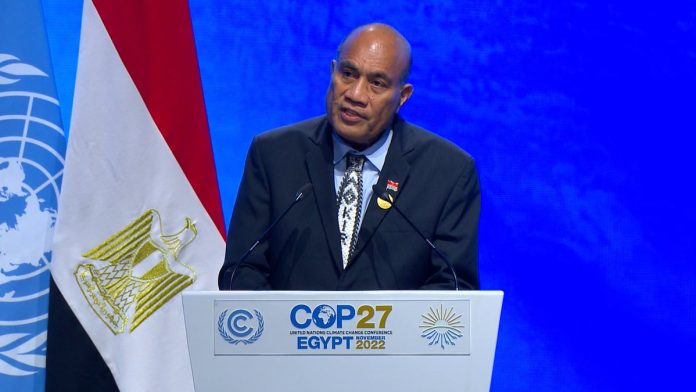One of the smallest and worst affected countries by the climate crisis, Kiribati, has called on the 27th United Nations Framework Convention on Climate Change Conference of the Parties (UNFCCC COP) to be more ambitious about the implementation of the Paris Agreement.
Speaking to world leaders during the High-Level plenary at COP27 in the red sea city of Sharm El-Sheikh in Egypt, the President of Kiribati, Taneti Maamau, reminded that climate change is real and his people continue to suffer the consequences of decisions made at the annual conference but are not followed up, financed and implemented.
“Consequently, for frontline countries like Kiribati this is detrimental to our sovereign desire to safeguard our future. Climate change is happening, loss and damage is real,” Maamau said.
“I appeal to my fellow leaders to stand in solidarity together to protect the future of our people, our young generation. We must be held accountable to our climate finance commitments to save our home. Action begins here and now before it is too late.”
President Maamau was among the first world leaders to address the High-Level plenary on Monday, aptly themed “Together for Implementation.” The Sharm El-Sheikh Climate Implementation Summit has been given a mandate to “fully implement” the Paris Agreement, which exists to limit global warming to well below 2, preferably to 1.5 degrees Celsius, compared to pre-industrial levels. To achieve the long-term temperature goal, countries who are part of the UNFCCC process, aim to reach global peaking of greenhouse gas emissions as soon as possible.
The President of Kiribati said this goal cannot continue to be negotiated for the sake of merely talking.
“Kiribati is at the mercy of the decisions being made here,” he said. “This year, Kiribati declared a state of disaster… The impact of storm surges and extreme king tides continue to be a threat to our economy, our future developments, destroying the very fabric of our livelihoods.”
Kiribati has a population of about 111,796. Human-caused climate change has led to oceans rising, leaving a disastrous impact on coastal communities and coastal ecosystems. Kiribati is also predicted to be one of the countries most impacted by climate change, in part to its vulnerability to sea-level rise. It is less than 2 meters above sea level, and continues to experience flooding, contamination of water sources, and food scarcity.
Despite all these challenges, the President remains optimistic.
“We remain hopeful that our collective efforts through partnerships will address these concerns…we need data, capacity building and technology transfer to make our adaptation and planning much more effective,” said President Maamau.
“Our commitment to building resilience is driven by the desire of the people to remain living in Kiribati. We will continue to strengthen our legislative and policy frameworks, including the recently enhanced Nationally Determined Contributions. The cost of maintaining our livelihoods in the face of climate change already exceeds our means, yet it doesn’t dampen our resolve to put resources where we can,” he said.
The 27th Conference of the Parties to the UN Framework Convention on Climate Change (UNFCCC COP27) is being held in Sharm el-Sheikh, Egypt from 06 to 18 November 2022.
SOURCE: SPREP/PACNEWS













